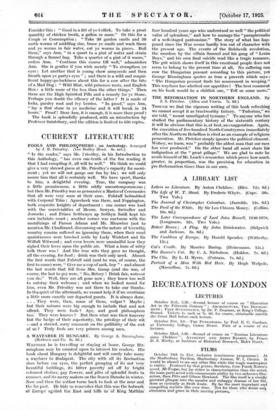A WAYFARER IN HUNGARY. By George A. Birmingham. (Methuen and
Co. 8s. 6d.) WHETIIER he is travelling or staying at home, George Bir- mingham may be counted upon to interest his readers. Ills book about Hungary is delightful and will surely take many a wayfarer to Budapest. The city with all its fascination rises before our eyes, the perfect grouping _ of its not" very. beautiful buildings, Its bitter poverty set off by bright' coloured clothes, gay flowers, and piles of splendid fruits in summer, and its merrymakers on the frozen Danube in winter. Nov and then the author turns back to look at the near and. the far past. He bids us remember that this was the bulwark Of Europe agtiliast the 'East and lelb its" Of King Matlu—a.S.
four hundred years ago who understood so well " the political value of splendour," and how to manage the "paraphernalia of a well-staged pantomime." The story of what has hap- pened since the War seems hardly less out of character with the present age. The events of the Bolshevik revolution, the murders by the villain Samuel and his gang of " Lenin Boys," and his own final suicide read like a tragic romance. The grit which shows itself in this emotional people does not seem to belong to the present time at all. No suffering can cow the Hungarian peasant according to this picture, yet George Birmingham quotes as true a proverb which says : " The Hungarian peasant finds his amusement in weeping." This wayfarer has whetted our appetites ! The best comment on his book would be a childish one, " Tell us some more."


















































 Previous page
Previous page